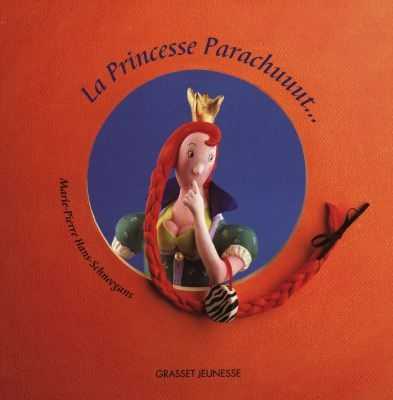
- La Princesse Parachuuut…
- Published by: Grasset Jeunesse
- Level: Beginner
- First Published in: 1997
An illustrated retelling of the famous Brothers Grimm fairy tale Rapunzel. The illustrations are photographs of actual dolls, reminiscent of a children’s playhouse.

La Princesse Parachuuut… by Marie-Pierre Hans-Schneegans is an illustrated retelling of the famous Brothers Grimm fairy tale Rapunzel. The illustrations are photographs of actual dolls, reminiscent of a children’s playhouse. When the two main characters are first introduced, the author cleverly rhymes “Roi Pistache” with his iconic “moustache” and the “Princesse” with her “tresse” (her long braid). Princess Lili is locked in a tower, but she has more attitude than old-fashioned Rapunzel. On every spread, readers can see her personal strength shine. She always starts her phrases with “Moi d’abord…” (Personally…), an expression meaning that she knows her mind and would definitely do things differently. Her first declaration is: “Moi d’abord un jour je me sauverai!” (Personally, I will save myself).
"The illustrations are photographs of actual dolls, reminiscent of a children’s playhouse."
Her father, the king, tries desperately to please and distract her, as she is locked up in her castle. He would prefer she be saved by a beautiful prince rather than through her own devices. The king brings in animal entertainers, but she responds, in her typical fashion: “Moi d’abord, ça me fait pas rire” (Personally, that doesn’t make me laugh). Her father then makes a giant cake, which she doesn’t like, though King Pistache gets cake all over his moustache: “Plein les moustaches s’en met Pistache!” This sentence sounds awkward when said out loud, since it has been reworded in order to fit into a lyrical rhyme scheme. These literary techniques are often found in poetry and in rhyming children’s literature.
The king then brings in a trumpeter, to play music for the princess. She responds with: “Ca me casse les oreilles,” a rude expression meaning that she cannot stand the trumpeter’s music. King Pistache’s moustaches are again personified, as the music makes it dance: “dansent les moustaches.” (Though the king’s whiskers are referred to in plural form, “moustaches” is meant as a general term.) He then buys her “roses de vents” (toy windmills). Yet she hates wind currents and abruptly slams her shutters: “d’un coup claque ses volets.” “Claque” is a great word, which sounds like a slamming noise, while “volets” is the name of old-fashioned door-like wooden shutters, which one might find in a castle or cottage.
"Some sentences sound awkward when said out loud, since they have been reworded in order to fit into a lyrical rhyme scheme. These literary techniques are often found in poetry and in rhyming children’s literature."
Finally, the king “dresse bien haut ses moustaches” (pulls up his moustaches), a funny way of saying that he gathers his courage, which he needs in order to get to the moon and offer it to his daughter. But she breaks it in two, making him mad. He exclaims, “Je t’offre un dernier cadeau si tu le boudes: au cachot.” That is, he will offer her a final gift, but if she “boudes” (pouts), he will send her to the “cachot” (dungeon). The princess decides to ask for a personally designed dress, saying to herself: “On va voir ce qu’on va voir…” (We will see what we will see…). This cheekily hints at a hidden motive. She asks for a big balloon-like dress, the “couleur de vent” (color of wind). So, the princess comes to wear the dress, clearly parachute-like, and jumps to freedom out of the window. “Hop et chuttt!” are the sounds she makes as she jumps and flies. “Hop” is the typical sound of something or someone jumping (and, also, of placing something on a new surface, as when offering someone coffee and placing the cup on the table). “Chuttt” is similar to “chute,” which means “fall.” The king’s moustache makes a final appearance: “(Le roi) ne croit pas ses moustaches.” Literally, he doesn’t believe his moustaches, which figuratively means that he’s surprised the princess escaped!
